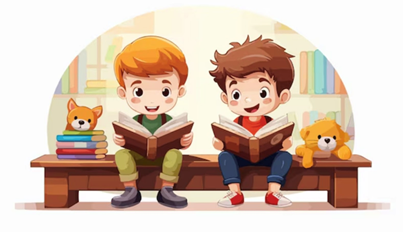Children's Book About Reading: Encouraging a Love for Books
Reading enables children to view the world differently. An excellent children’s book about reading is not just a story; it also initiates imagination, curiosity, and makes kids fall in love with books forever. Each page is a new adventure. Children can learn, dream, and find their identity in the world through tales.

A children's book about reading is developed to make it inviting to children to experience the joys of books and to improve their literacy level in the process. The books often combine stories, pictures, and actions to make the reading process appear fun and meaningful.
What Is a Children's Book About Reading?
A children's book about reading is created in such a manner that children fall in love with books as they are introduced to the basics of reading. These tales are a combination of easy words and bright illustrations that make the process of reading a joyful and a learning experience.
Key features of these books include:
* Simple and clear language: Sentences are brief, concise, and simple.
* Engaging illustrations: Images make children relate pictures to words.
* Interactive elements: There are books with little assignments or questions to retain the reader.
* Storylines about reading: The characters are also enthusiastic to read and encourage children to read.
A children's book about reading can be highly effective in the use of stories, pictures, and action, which can make reading an easy and memorable experience
Why Children's Books About Reading Are Important
There are many advantages of introducing children to books at a tender age:
1. Literacy Development
It is through regular book reading that children recognise letters, understand words, and build up their comprehension. The repetitive text and phonics strategies frequently emphasise early literacy in children.
2. Cognitive Growth
Stories help children in thinking, remembering, and making predictions. This builds problem-solving ability, memory, and the ability to concentrate.
3. Emotional Intelligence
Books are exposed to children, and they are exposed to social life, emotions, and morals. The emotional understanding and empathy are acquired when children are informed about the emotions of characters
4. Encouraging a Love for Learning
An enjoyable reading process will make children more interested in reading other topics, becoming more inquisitive about learning.
5. Improved Communication Skills
Listening and reading can help children expand their vocabulary and improve their ability to articulate ideas.
Types of Children's Books About Reading
Books that can make children enjoy reading are of a variety:
1. Picture Books: Essentially child-friendly; loaded with vivid pictures and brief text. (Ages 2-6)
2. Storybooks About Reading: Book-loving stories that make the characters love books. (Ages 4-8)
3. Interactive Books: Reading is made practical and interactive with flaps, pop-ups, or games. (Ages 3-7)
4. Early Readers: Short chapters and simple words help young readers gain confidence. (Ages 5-9)
5. Series Books: Children will come back because of familiar characters. (Ages 6-10)
The correct type is determined by the age, reading level, and interests of the child.
How to Encourage Children to Read
Children should be guided and encouraged to read well, even when they have the right books:
* Read Aloud Together: Reading aloud generates a connection and enhances concentration
* Create a Reading-Friendly Environment: Reading is made easy with a comfortable chair and lighting.
* Incorporate Choice: Allow children to select their books, and they get the feeling that they are in charge.
* Set a Routine: Ten minutes per day will become a lifetime routine.
* Discuss the Story: Ask what they have heard in the book or what they like.
* Celebrate Progress: Compliment even the smallest achievement, such as completing a book or reading aloud.
Benefits of Reading From a Young Age
The early and frequent reading of books has lifetime benefits:
* Stronger Academic Performance: Young readers tend to perform better at school.
* Better Critical Thinking: The interpretation of plot lines and the making of conclusions build analytical skills.
* Boosted Creativity: Reading creates imagination and new ideas.
* Stronger Emotional Health: Storytelling assists children in managing emotions.
Tips for Selecting the Right Children's Book About Reading
When choosing books, consider:
* Age Appropriateness: Make sure that the material is on par with the reading and understanding ability of the child.
* Illustrations: Visual aids aid in keeping attention and comprehension.
* Story Engagement: An interesting plot will encourage kids to read further.
* Learning Value: Vocabulary, sentence structure, or reading strategies should be taught in books.
* Cultural Relevance: Diverse and real-life stories are more effective.
Conclusion
A children's book about reading is not just paper and words; it is a gateway to imagination, learning, and development. By reading regularly with children, parents and teachers do not just impart literacy in children, but they also develop creativity, compassion, and curiosity. Every page a child reads makes them one step nearer to becoming a lifetime reader of books, not as an obligation but as a friend.
FAQs
Why are children's books about reading important?
They assist children in the growth of literacy skills, imagination, and emotional intelligence.
How can I motivate a reluctant reader?
Offer books on topics they enjoy, read together, and make the process interactive.
Can these books improve academic skills?
Yes, early reading develops vocabulary, comprehension, and critical thinking that enhance general performance at school.